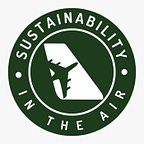In this episode of our 'Sustainability in the Air' podcast, Shashank Nigam, CEO of SimpliFlying, speaks with Delphine Millot, Senior Vice President for Advocacy & Sustainability at Global Business Travel Association (GBTA), who shares insights into GBTA’s initiatives to promote sustainability in business travel and the challenges faced by the industry.
Millot also serves as the Managing Director of the GBTA Foundation, the charitable arm of GBTA, focusing on workforce development, driving meaningful industry action, and addressing climate challenges in the business travel sector.
Here are the key highlights of the conversation:
Understanding the priorities of travel managers (0:39)
The role of GBTA Foundation in promoting sustainable travel (2:47)
The impact of business travel on emissions and the potential for change (4:14)
GBTA’s sustainable procurement criteria initiative (5:42)
The role of Sustainable Aviation Fuel (SAF) in decarbonising business travel (17:42)
Regional differences in sustainability efforts (22:55)
The future of sustainable business travel and GBTA’s acceleration challenge (34:32)
Rapid Fire! (38:41)
Keep reading for a quick overview of the episode.
Why sustainable business travel matters for the future of aviation
Business travel, often criticised for its significant contribution to aviation emissions, is at a crossroads. As Millot explains, the sector plays a crucial role in global business operations, but is also facing increasing pressure to address its environmental impact.
“I think [business aviation] has a fair share of emissions. But one of the differences between leisure travel and business travel is there’s really less of an element of choice when it comes to corporate travel. Employees are being asked to travel as part of their jobs; it’s part of what they have to do.”
The concentrated nature of business travel spending – about $1.4 trillion annually – provides leverage for driving sustainability in the wider travel industry. By shifting this demand towards more sustainable options, business travel can potentially drive change at a faster pace than more dispersed consumer markets.
Moreover, for many companies, especially in sectors like financial and professional services, business travel can represent a significant portion of their emissions. As Millot notes:
“Sometimes 80% of emissions come from scope 3 category 6, which is business travel. So, companies will have to invest in sustainable aviation fuel certificates if they are to meet their net-zero and SBTi targets.”
As companies look for innovative solutions to reduce their travel-related emissions, the business travel sector can become a potential catalyst for change and even a test bed for new technologies like electric planes.
The GBTA aims to find solutions to make business travel more sustainable. This includes not only technological solutions like SAF but also policy changes and behavioural shifts.
“We have to continue flying; there’s no way around it. It’s the way our societies work, it’s the way we create value for governments, for business, for everyone. So not flying is not decarbonising travel.”
Five ways GBTA is envisioning the future of sustainable business travel
1. Developing global sustainable procurement standards
One of GBTA's key initiatives is the development of global sustainable procurement standards for business travel. As an open-source, industry-wide solution, the initiative aims to offer a consolidated bank of sustainability questions they should consider when making procurement requests. The process of standardisation also allows suppliers to be better prepared to respond to buyers’ requests.
GBTA has already released standards for aviation and hotels, with standards for ground transportation and car rentals scheduled for release in the fall. The standards have been designed to account for each sector’s unique challenges and opportunities.
"For aviation, we’re very focused on emissions and the carbon impacts of aviation. When it’s a hotel, emissions are incredibly important, but we’re looking a lot more at impacts on biodiversity, waste and water, etc.”
2. Promoting Sustainable Aviation Fuel (SAF)
GBTA sees SAF as one of the most promising ways to decarbonise aviation in the near term. The organisation is actively encouraging the business travel community to send demand signals for SAF, often through the purchase of SAF certificates.
Millot also acknowledges that there are challenges in the SAF market, particularly around accounting and transparency. GBTA is pushing for clarity on these issues to accelerate corporate investment in SAF.
3. Fostering collaboration between travel managers and sustainability teams
To drive meaningful change, GBTA sees collaboration between travel managers and corporate sustainability teams as essential. While travel managers handle the carbon footprint data and optimise travel decisions, the overall emissions reduction targets are set by the sustainability teams.
Millot notes that this kind of collaboration is already happening in many organisations:
“Collaboration is essential because travel managers, who are experts in travel and procurement, need to work with sustainability teams to set emission reduction targets. Travel managers can advocate for addressing travel emissions and support sustainability goals, while sustainability teams can involve travel managers to meet SBTi targets. This partnership ensures both groups effectively contribute to reducing overall emissions.”
With access to key travel emissions data, travel managers are well-positioned to advocate for emissions reduction, even in companies where travel accounts for only a small portion of overall emissions.
4. GBTA Sustainability Acceleration Challenge
Recently, GBTA launched the GBTA Sustainability Acceleration Challenge, in collaboration with Accenture, to help organisations reduce their business travel emissions and accelerate their journey towards net zero.
The initiative focuses on four key areas: setting targets, tracking emissions, making sustainable travel decisions, engaging suppliers, and investing in SAF.
Corporate organisations can take a maturity assessment and receive a company score rather than a ranking to encourage them to take action. The results will be tracked annually via an interactive dashboard, providing detailed insights into global business travel sustainability and meeting industry and policymaker demands.
“We’ve developed a pathway around levers of actions that we've identified: target setting, emission tracking and reporting. The assessment is around travel decisions and activation of the features at the point of booking. It’s about supplier engagement and sustainable procurement. And it’s also about investments in SAF.”
5. Leveraging technology and AI
GBTA sees promising developments in the use of artificial intelligence to promote sustainable business travel. Millot shares that a lot of new companies in their business travel ecosystem are using AI to generate travel data and run predictive analyses, which helps inform their corporate booking systems and enables better travel decisions.
However, Millot emphasises the need for standardisation of the methodologies used to calculate emissions to ensure consistency and ease of data comparison.
‘Sustainability in the Air’ is the world’s leading podcast dedicated to sustainable aviation. Through in-depth conversations with top aviation leaders, we break through the clutter and provide a clear roadmap for a net-zero future.
For September 2024, we’re proud to feature Estuaire as our exclusive Sponsor of the Month. Estuaire is an aviation and climate data platform designed to help aviation brands make smarter, more informed decisions, especially when it comes to addressing non-CO2 impacts. Discover how they can support your sustainability goals.













